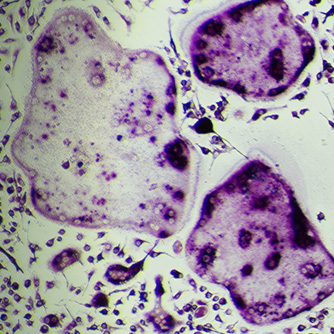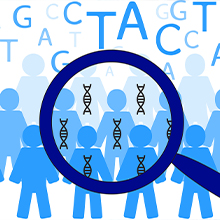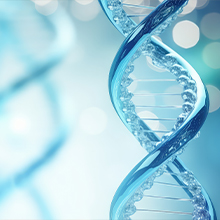In recent years, the spread of new infectious diseases and efforts to extend healthy life expectancy have increased people's awareness of their own health; however, there are individual differences in the mental and physical problems that occur in each individual and the solutions to these problems, so there is a need for solutions suited to each individual. We have focused on genetic polymorphisms, one of the factors that cause individual differences, and have been conducting research in order to propose new habits to realize a life of well-being.
Heredity is the process by which an organism passes on its qualities to its progeny; the genome is the collection of all genetic information. Genomes consist of deoxyribonucleic acid (DNA), which is made up of four nucleotides (adenine, thymine, guanine, and cytosine) linked in long chains, the human genome consists of roughly 3 billion base pairs (Figure 1). While the majority of nucleotide sequences are identical between individuals, certain sequences vary from person to person. These variations are known as polymorphisms when they occur in the population at a frequency of 1% or more. Genetic polymorphisms come are diverse. Single nucleotide polymorphisms (SNPs) are variations in which one base in a sequence is substituted for another. It has been observed that SNPs affect the determination of individual differences*1(Figure 2).
*1Y Okada: Statistical genetics seminar practiced from zero: Linking disease and genome, Yodosha Co, Ltd., 2020.


Genome decoding technology has made remarkable progress. Now that a very large number of human genome sequences have been decoded around the world, enabling the accumulation of a vast amount of information on genetic polymorphisms, research related to genetic polymorphisms has also made strides. The Genome-Wide Association Study (GWAS) is a technique used to identify SNPs linked to certain events. GWAS is a technique used in such undertakings as medication development and illness risk research that allows for a thorough analysis of hundreds of thousands to millions of SNPs in the human genome. We are also attempting to use GWAS to clarify the connection between consumers’ health issues and SNPs in order to create products and services that will result in preventive actions and the best possible solutions for such issues. We are focusing on lactoferrin (LF), a protein obtained from milk, at the outset of our investigation into whether SNPs have a role in determining individual variations in the functional characteristics of food.

Developing Pre-Caries Detection Technologies

Gum Disease Prevention Technology Development Focused on the Periodontal Tissue

Skin Research that Draws Out Skin’s Natural Strength

Study of a Specific Example of Genetic Polymorphism—The Relationship between the Function of Enteric-coated Lactoferrin and Single Nucleotide Polymorphisms (SNPs)

Genetic polymorphisms research to provide individualized healthcare based on each person's constitution
Related Information